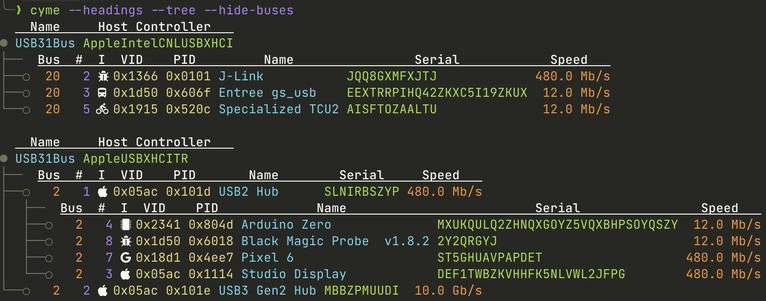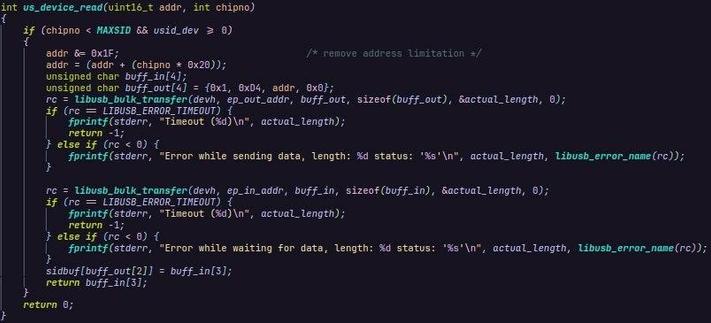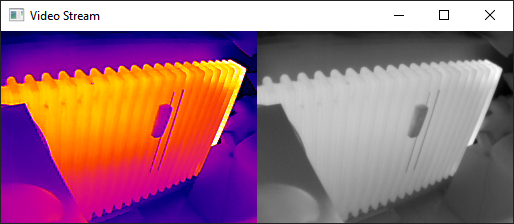#libusb 1.0.28 RC1 has been released (#USB / #API) https://libusb.info/
#libusb
Considering the Windows editor for my #DNAfx GiT Core won't run on neither Wine nor any VM, I've spent the past few days trying to reverse engineer its USB protocol, in order to write a basic editor for Linux of my own. It's been interesting so far to play with #libusb (I can already kinda talk to the device), especially coming from the perspective of a network developer, but I have some doubts on how #USB communication works in general: is there anyone around here that can clarify a few points?
Today I discovered a pretty cool utility for listing USB devices! 🔌
🌸 **cyme**: A modern and cross-platform lsusb!
🔥 Displays manufacturer, serial number, speed, current information (mA) and more!
🦀 Written in Rust!
⭐ GitHub: https://github.com/tuna-f1sh/cyme
#rustlang #lsusb #usb #devices #utility #commandline #tool #libusb
I could really use some #libusb experts opinion on getting this function faster. The round trip takes 100~200 uS and is just too slow, but async read causes race conditions.
A single write takes 30 uS (async). Ive already removed all overhead on the device side code but the time stays the same. #tinyusb #rp2040
via @loudfpv
#libusb 1.0.27 has been released (#USB) https://libusb.info/
It works, but everything is hardcoded. Need to add some configuration system. #streamdeck #WriteInC #libusb
Can anyone recommend a #framework that allows relatively easy cross-platform (#Android, #Windows, #Linux) development?
Needs to be able to:
- Open #USB webcam stream
- Call #ffmpeg
- Send USB vendor control transfers (or calls to #libusb)
- GUI
:BoostOK:
I really don't want to write code two times (and dislike Android app dev), but recently realized that I'd really like for my upcoming #P2Pro viewer to run on Android too.
But if there is no such thing, I'll stick to desktop only for now :/
Day 2 of my posting adventures to finally figure out what is going on with my build of #libuhd #libusb on #openbsd :openbsd:
https://sourceforge.net/p/libusb/mailman/message/37796867/
:boost_ok: boosts would be v helpful in case anyone has seen something like this before, esp from bsd folks or sdr folks #ham #sdr #bsd
With libusb_get_bus_number(), and libusb_get_port_numbers(), one can easily construct a path like /sys/bus/usb/devices/{BUS}-{PORTS} to access the string descriptors as "product", "manufacturer", and "serial" (if present). And /sys/bus/usb/devices/{BUS}-{PORTS}:{CONFIGNUM}-{INTERFACENUM} has "interface" for the interface string descriptor (if present).
Annoying. libusb requires you to open a device before reading string descriptors (necessitating you have read/write permission because libusb only opens devices RW).
On modern Linux (and I believe on Windows and OSX) this is not actually necessary and makes enumeration and reporting errors to users that much more complicated than need be.
This feature has been discussed, but there has been no forward motion, it seems:
https://github.com/libusb/libusb/issues/866
Yesterday I've learned what USB filter drivers are on Windows and that it's apparently pretty easy to install libusb0 as one. (Thanks @patagona)
Having done that, my initial plan worked on the second try. I can now send the command for switching the color palette, wohoo \o/
I only needed to make sure that I send the USB control transfers after the video capture has already been started, otherwise the call to #libusb will just hang indefinitely for whatever reason.
Okay no it isn’t. But Thursday’s probably the day I start working with #libusb.
So today is probably the day I start working with #libusb.
Mein POS-Kundendisplay läuft nun auch unter Linux.
Es reicht schon, das Gerät mit #PyUSB über #libusb aufzumachen, die erste (und einzige) Konfiguration zu aktivieren und die seriellen Daten auf den per Wireshark ermittelten #USB-Endpoint zu schreiben.
Ich muss jetzt noch mal abwarten ob irgendwann der Puffer platzt weil ich keine Daten abhole, aber bisher funktioniert es und so viel hat ein #Display eh nicht zu erzählen.
`#libusb: debug [handle_events] caught a fish on the event pipe`
🎣 ❓
Would someone on *buntu 18.04 tell me what version of #libusb they have installed by default?
And could you indicate whether you upgraded from a previous *buntu version or did a fresh install of *buntu?


